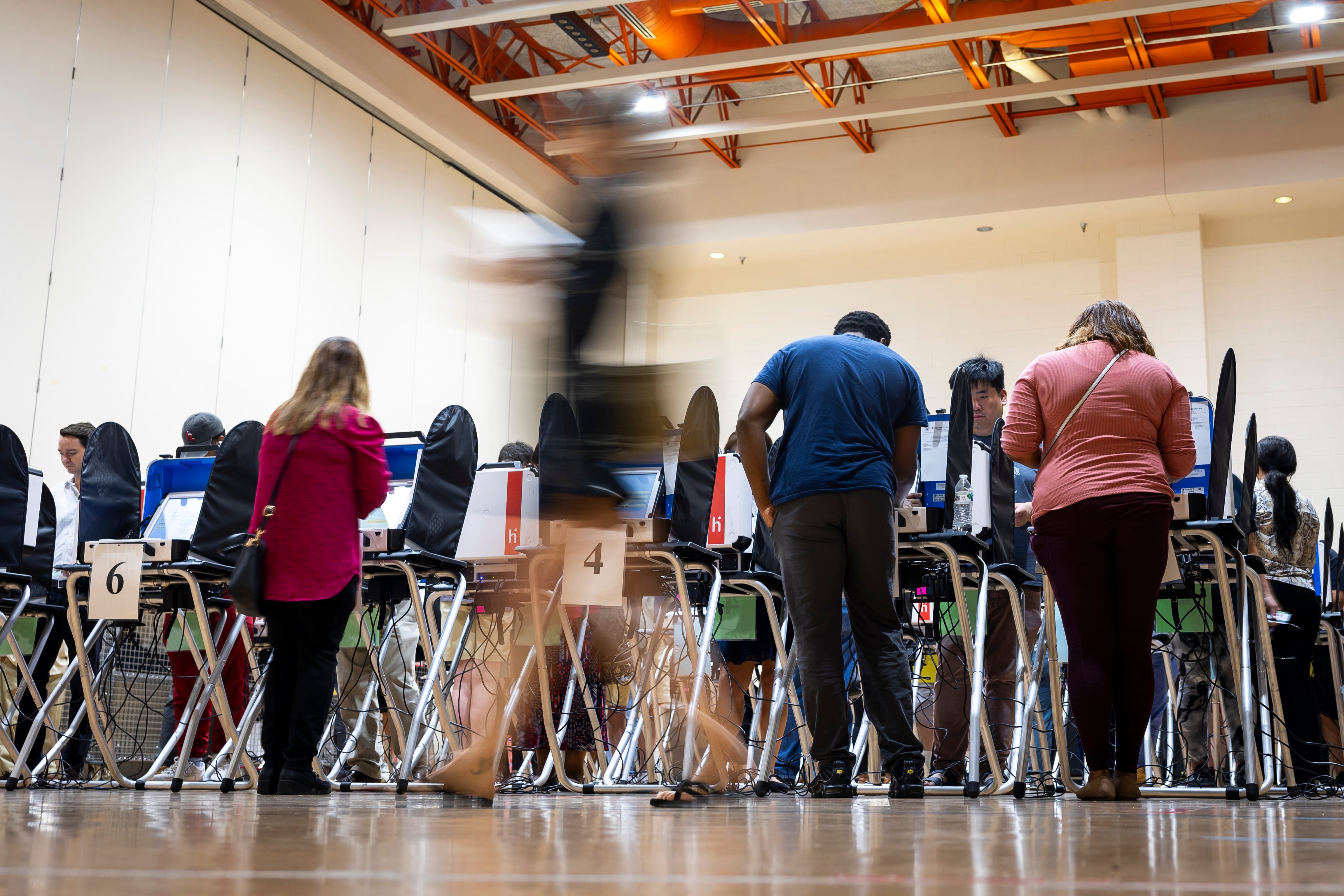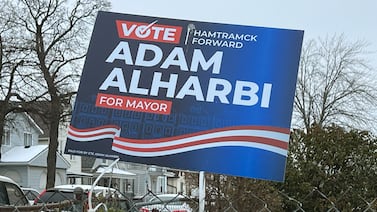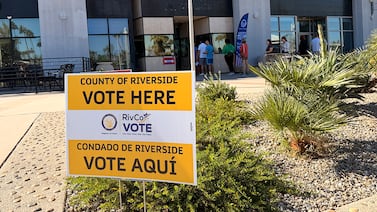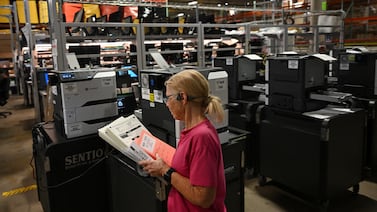Votebeat is a nonprofit news organization reporting on voting access and election administration across the U.S. Sign up for our free newsletters here.
By all accounts, Harris County pulled off a smooth local election last week under its newly reconfigured election administration. But officials didn’t have time to revel in it before a judge took them to task for the serious mistakes that marred its election one year ago.
Nonetheless, Harris County officials say they believe they’re now on a path to deliver a successful 2024 presidential election under a new election chief, County Clerk Teneshia Hudspeth, and are clear-eyed about the work they still have to do.
Judge David Peeples laid some of the hurdles out in his long-awaited ruling, in which he upheld the results of the 2022 election and ruled against a Republican judicial candidate who claimed thousands of voters had been unable to cast ballots because of a ballot paper shortage at various polling locations. He also dismissed all but one of the 21 remaining election contests by other candidates, saying they were without merit.
But deeper in the ruling, Peeples said the county’s elections administration department violated the state law in the way it calculated how much paper to allocate for each polling location. “Had the [elections department] simply tried to obey the Legislature, twenty-one election contests might have been avoided because the shortages of ballot paper caused much of the Election Day chaos. The consequences of the [election’s department] decision were foreseeable, avoidable, and costly,” the ruling says.
The law requires election officials to calculate how much ballot paper to allocate to each polling location by looking at voter turnout from previous comparable elections, and adding 25% to that number. Harris County, Peeples said, had not done that, and had not reached out to the secretary of state’s office for guidance to make sure they were supplying polling places correctly.
Peeples also criticized Clifford Tatum, the county’s former elections administrator, and the Harris County elections office on other fronts, including an incident in which Tatum gave assurances through the county attorney on Election Day that if a court ordered an emergency extension to voting hours, the county would be able to supply all polling sites with sufficient paper. The county ultimately couldn’t deliver on that assurance, and Peeples suggested Tatum therefore had given “untrue” information. In his ruling, Peeples says Tatum “was not candid with the trial judge when she tried to learn whether there would be adequate ballot paper for all the polling locations.”
County Attorney Christian Menefee, who represented Tatum, said he disagreed with the judge’s characterization of what happened and that it was not relevant to the issue. Tatum did not respond to a request for comment.
The problems last year in Harris — the third most populous county in the country — were not unprecedented or large in scale, but the long wait times and the ballot paper shortages at about 20 polling locations could have been avoided with better planning, experts say. Harris County provides voting on Election Day through countywide vote centers, which allow voters to go to any location to cast a ballot, unlike a precinct-based system. At these vote centers, each voter’s ballot is printed to reflect the local races based on where they live.
Bruce Sherbet, Collin County elections administrator, who has been running elections in Texas for over two decades said, to be on the safe side, it is best practice to plan for more than just the additional 25% supply of ballot paper that the election code mandates.
“You have to go at least 50% over that number. You just can’t take the risk of running low. And if you do run lower, you’ve got to have a really robust and good training curriculum to tell your workers to monitor their stock,” he said.
By the time the November 2022 general election came around, the county elections office had already seen its first leader step down, voters were still getting used to new equipment, and the then–newly appointed election administrator, Tatum, had less than three months to prepare. Logistical problems surfaced.
“The elections office had too many Election Day voting centers [in 2022], relative to the resources they had available,” said Bob Stein, a political science professor at Rice University who has done research into election supply allocation and vote centers. “And the biggest problems were at the newest voting locations where there was no history of voting.”
The primary and presidential election will rely on the county’s ability to train what is likely double the number of election workers and run many more polling locations, and based on the county’s performance this off-cycle election year, it may be positioned to do that well in 2024, Stein said.
Harris County Republican Chair Cindy Siegel, who backed the push for a new election after the 2022 problems, said she agrees with Peeple’s assessment of the past problems, but is seeing signs of improvement. She described herself as “cautiously hopeful that we’re moving in the right direction” under Hudspeth.
“I’m hopeful as long as the communication lines are kept open, that we can move to the point where our elections are fair and secure and run properly and according to the law, because that’s all we want,” she said.
County is ‘turning the page’ on the past
Hudspeth, who took over elections this fall in her role as clerk after Republican legislators abolished the county’s election administration office, said county officials are committed to building trust with voters and resolving the problems highlighted in the ruling, pointing to changes they made for the most recent election.
“The public needs to know that there is a chief election official for the county who is committed to conducting the elections with a nonpartisan spirit and in accordance with the law to enable all voters equal access to the voting process,” Hudspeth said Monday in a statement to Votebeat.
Hudspeth, the sixth person to be in charge of running Harris County’s elections in the past six years, said that in order to prevent ballot paper shortages of 2022 from happening again, her office will follow the law and provide paper “beyond what the law requires.”
Hudspeth signaled her intention to seek feedback from the secretary of state, which Peeples suggested in his ruling that the elections department did not do last year to calculate how much paper to distribute. She told Votebeat that she invited the secretary of state in 2023 to review their training, testing, and to “observe our early voting and Election Day processes.” Hudspeth added that although election officials can seek feedback from the state in regards to the distribution of materials, “in the end, that is a challenge that can only be addressed by local election officials based on their familiarity with their county,” she said.
In 2020, Harris created an elections department and appointed its first elections administrator. County leaders initially appointed an inexperienced elections administrator, Isabel Longoria, to lead the newly created department, which had also at the time just purchased new voting equipment voters would have to learn to use. Longoria resigned in July 2022, after the department failed to report unofficial primary election vote totals to the state by the deadline required by law and later failed to include 10,000 mail-in ballots to its election night results.
Tatum, who ran elections in other jurisdictions and previously worked as an elections consultant, inherited Longoria’s department with very little time to fix lingering administrative problems when he was appointed to his role last summer. Under his tenure, in the November 2022 general election, Harris County had to extend voting for an hour after various polling places experienced problems with voting machines, paper ballot shortages and long waiting times. At the time, Harris County’s elections department lacked a tracking system typically used by large counties to identify issues in real-time, and for months, could not say how many polling locations ran out of paper on Election Day or whether anyone was prevented from voting.
The Houston Chronicle subsequently reported that only about 20 polling locations out of the more than 782 ran out of paper.
The problems last year in the heavily Democratic county prompted Republican state lawmakers to pass legislation abolishing the elections administrator position — only in Harris. The county sued the state to prevent it from taking effect, but couldn’t beat back the new law.
Despite the county’s effort to challenge the law in court, it went into effect on Sept. 1, placing Hudspeth in charge of administering elections and Ann Harris Bennett, the county’s tax assessor-collector, in charge of voter registration heading into the presidential election. Lawmakers have signaled they’re watching closely.
Some county officials say the resolution of the election contests mean the county can start moving on from the 2022 problems, planning for a Dec. 9 mayoral runoff and building on its 2023 gains.
“It’s my hope that we’re turning the page on these various conflicts and that the clerk’s office is going to be able to work with state actors to ensure that we’re all moving in the same direction,” Menefee said.
Natalia Contreras covers election administration and voting access for Votebeat in partnership with the Texas Tribune. Contact Natalia at ncontreras@votebeat.org






